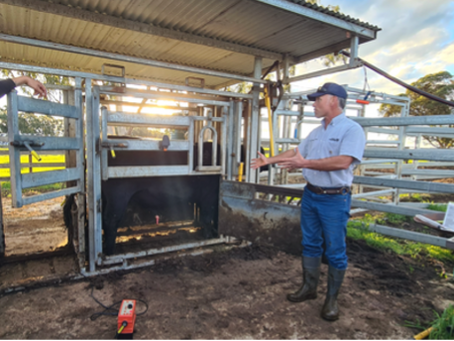
Preventing Bull Preputial Breakdown by Vaccination
MLA Producer Demonstration Site
2023 - 2026
Project Facilitator: Dr Enoch Bergman
Lead Producer: Simon Fowler
ASHEEP & BEEF Coordinator: Sarah Brown
Updated 21/03/24
Preventing Bull Preputial Breakdown by Vaccination is a 3 year project, run by ASHEEP & BEEF in collaboration with Swans Veterinary Services and local producers, and funded by Meat & Livestock Australia (MLA) through the Producer Demonstration Site program.
The project aims to demonstrate that a commercial Bovine Herpesvirus vaccine (either Rhinogard or Bovilis MH + IBR) prior to mating can reduce the incidence and severity of Bovine Balanoposthitis and hence bull wastage in virgin British bred bulls. Secondarily, the project aims to establish a baseline incidence of the syndrome and produce statistics useful to estimate both the cost of the syndrome to Esperance producers and the return on investment of vaccination.
The results of the project will lead to greater uptake and a greater understanding of the pathophysiology of viral induced preputial breakdown potentially improving awareness well beyond the Esperance district.
Background
Virgin bulls are susceptible to Bovine Herpes Virus subtype 1 induced balanoposthitis (inflammation of the penis and prepuce). If contracted during the breeding season, injury can lead to reduced pregnancy rates (due to failure to achieve intromission or forced sexual rest and/or premature culling of young bulls).
Swans Veterinary Services with assistance from the Department of Primary Industries and Research Development WA has demonstrated with a high degree of confidence that Bovine Herpesvirus was contributing to a significant number of balanoposthitis cases in virgin bulls within the Esperance agricultural district.
Premature culling of virgin bulls has a direct cost in uninsured bulls, an indirect cost in a higher perceived need for first season insurance, an indirect cost in a need or a perceived need for additional annual bull requirements to cover breakdowns, and an indirect cost in reducing pregnancy rates in populations of females serviced by bulls which suffer breakdown during mating, especially when undiagnosed for a reasonable amount of time.
Coopers has produced a killed Manheimia hemolytica and bovine herpesvirus vaccine in 50 and 125 does vials that can be shared between producers, and Zoetis has recently introduced a modified live Bovine Herpesvirus vaccine in 10 dose vials. The recent availability of small dose packaging may greatly simplify vaccination for many smaller producers both logistically and economically.
Project objectives
By December 2025, in the Esperance Region of Western Australia:
-
Conduct survey work as part of a pre project survey of all reachable Esperance producers to establish the incidence of balanoposthitis in virgin bulls during their first mating season both seasonally and historically.
-
Demonstrate the potential of two commercially available Bovine Herpesvirus vaccines to:
-
Reduce the incidence of balanoposthitis in virgin bulls during their first mating season.
-
Reduce the severity of balanoposthitis in virgin bulls during their first mating season.
-
Reduce the degree of virgin bull wastage associated with balanoposthitis during their first mating season.
-
-
Develop a cost benefit analysis to demonstrate the value of vaccination in measured reductions in premature culling and/or veterinary treatment costs.
-
Conduct annual field days and other activities to showcase the demonstration site results and to encourage ongoing adoption of vaccination practices by 100% of core producers & over 50% of observer producers by close of project.
-
Conduct a pre and post project survey to gauge understanding of the pathophysiology of the syndrome and the steps that can be taken to mitigate it. These surveys will be used to demonstrate that a target of 100% core producers and 70% of observer producers will have improved their knowledge and skills in this area. Measurable improvement in observer producer understanding will provide a proxy for the capability of further extension nationally.
-
Integrate the role of vaccination for Bovine Herpesvirus into a larger suite of extension targeting bull pre-mating preparation.
There are opportunities throughout the project for producers to attend workshops, tours and field days.
This project has animal ethics approval via the Department of Primary Industry & Regional Development Animal Ethics Committee.
Contact ASHEEP & BEEF if you would like more information on this project. ASHEEP & BEEF members will be provided with regular updates, visit our membership page if you would like to consider joining.
PROJECT UPDATES:
PROJECT PARTNERS:

















